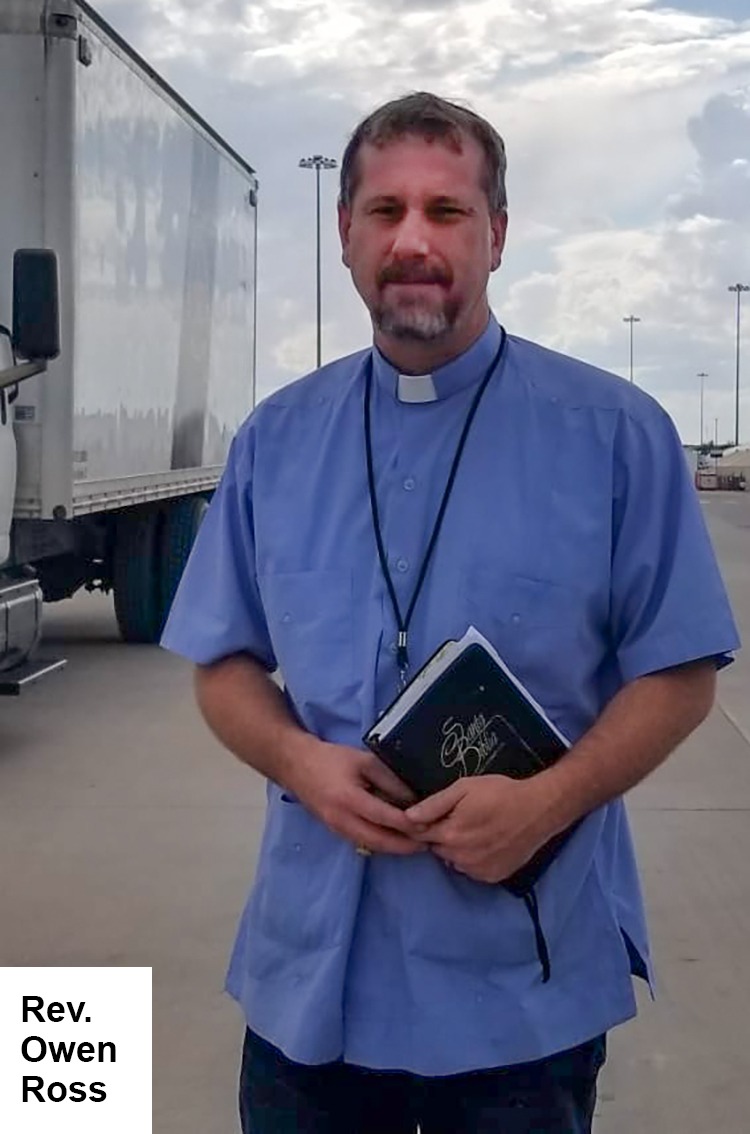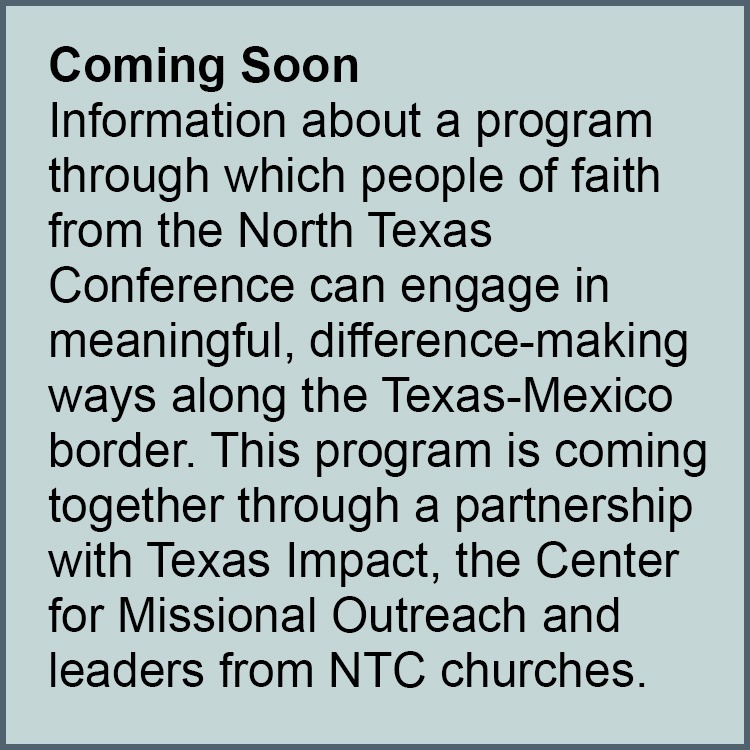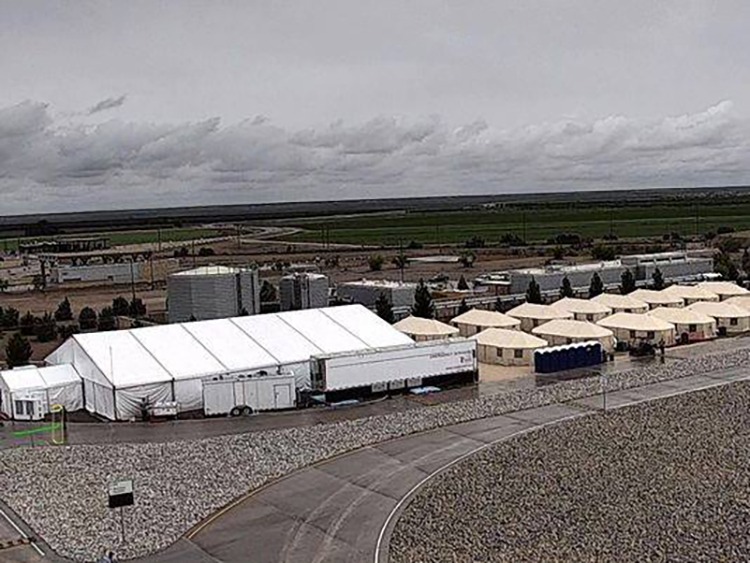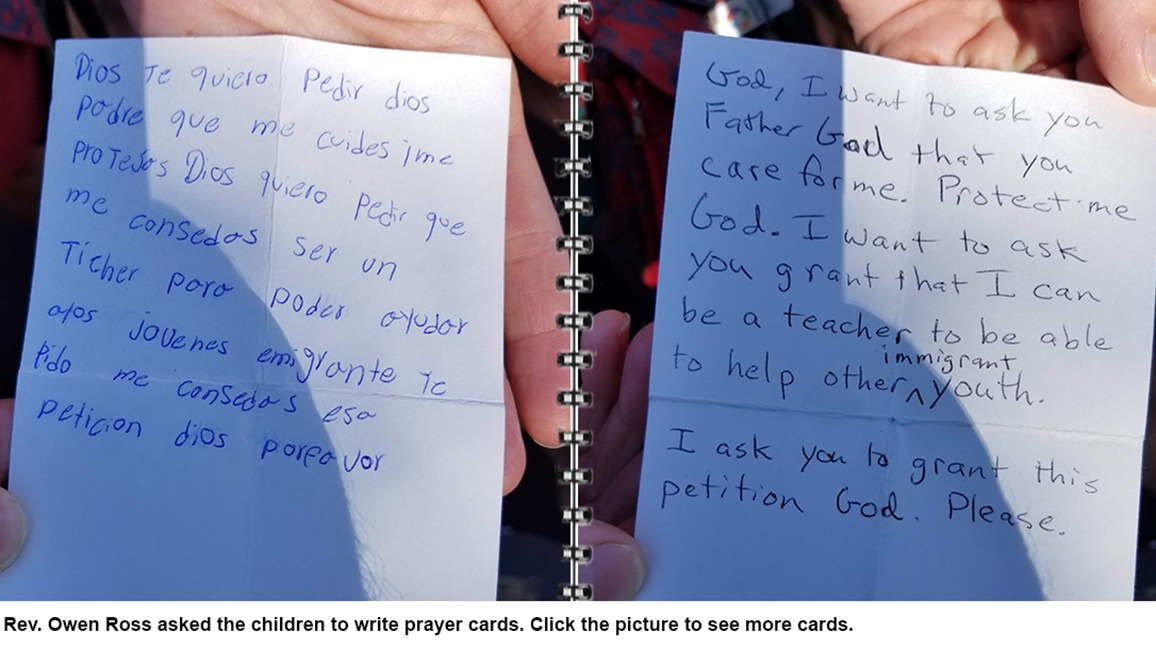‘There is a Kingdom of God Factor that Connects Us All’
Rev. Dr. Owen Ross offers update on worship efforts with unaccompanied minors in Tornillo, Texas
One month ago, news was breaking that over 10,000 minors were being held in detention centers at the U.S. border, many of whom had been forcibly separated from their families and others who had made it to the border unaccompanied. Many of us were heartbroken and confused as to why this was happening and wondered what we could do.
Clay Jenkins, a United Methodist and Dallas County Judge, was one of these people. As he pondered how he could care for immigrant youth at the border, he reached out to some of his contacts at BCFS (formerly known as Baptist Child and Family Services). Quickly, he learned that this nonprofit organization, caring for minors at a detention center in Tornillo, Texas, could provide worship services for the youth, but the government could not pay for those religious experiences. In that moment, a ministry began to take shape.
 Jenkins would soon connect with one of his pastors at Highland Park UMC, Rev. Elizabeth Moseley. Rev. Moseley then connected with pastors and religious leaders such as Rev. Dr. Owen Ross, the North Texas Conference’s director of the Center Church Development, and others who shared Jenkins’ passion for bringing a Spanish-language worship service to the youth in Tornillo. These worship leaders have traveled to the border to offer praises to God and hope to youth with an unknown future.
Jenkins would soon connect with one of his pastors at Highland Park UMC, Rev. Elizabeth Moseley. Rev. Moseley then connected with pastors and religious leaders such as Rev. Dr. Owen Ross, the North Texas Conference’s director of the Center Church Development, and others who shared Jenkins’ passion for bringing a Spanish-language worship service to the youth in Tornillo. These worship leaders have traveled to the border to offer praises to God and hope to youth with an unknown future.
As Dr. Ross prepared for a recent trip with this team, he stopped for a quick interview with the Texas Methodist Foundation (which provided a $5,000 grant to assist with transportation costs) to share more about this ministry and how churches could make a difference in the lives of minors, who are awaiting the determination of their future.
What exactly are you doing and what is involved? How are the teenagers, who participate, responding?
Ross: Each week, we go into the detention center and lead a worship service at 10 a.m. for about 340 teenage boys. Most are unaccompanied minors, but some arrived with their families and were separated. Then, we have lunch and an afternoon worship service with about 35 teenage girls. We seek to find songs they know and songs that are relevant. When they are singing a song they know, they fill the room with their voices and sing with abandon. They see God as their only hope; worship becomes very powerful when people have a deep hunger and a very present need for God to intervene on their behalf.
When we go into communion and prayer time, most of the team goes around the room to reach teens who want personal prayer. I believe that is the most important service we are providing. The No. 1 prayer request: Pray for my case. The No. 2 prayer request: Pray for my mom or other family members. They are afraid; they are afraid of being sent back to their country of origin after they have been on such an arduous journey. They are afraid for their family members who are left behind, and they are scared to discover what will happen if they are deported.
Why do you believe this ministry is important?
I believe this ministry is important because everyone should be able to worship God and everyone needs hope. We are also providing a safe place for an emotional release. Tears flow freely, even in the boys’ service. During the prayer time, there is permission to cry out to God.
 How are you funding this ministry?
How are you funding this ministry?
The only expense we incur is transportation to El Paso. Luckily, American Airlines has provided a humanitarian rate for our flights. Still, it is expensive. We have been fundraising through Highland Park UMC and they set up an online donation form for us. Additionally, TMF gave the largest gift to date, a generous grant of $5,000. Many people want to be part of this ministry, but they do not speak Spanish or they are not worship leaders. So, we want to give people a way to participate even if they cannot go inside the detention center.
What are you learning from this experience?
I am learning how much people care about these kids and how persons of all political persuasions – when I have shared what worship is like and how these teenagers are praying for freedom and praying for their parents – suddenly do not see politics, they see how this is about people. There is a kingdom of God factor that connects us all; when we worship together, we are powerfully reminded of a borderless God.
I am also learning just how afraid those in our detention facilities are. They are afraid of the unknown. That fear can only be combatted with love and hope; that is why we go.
Who are some of your partners?
Our primary partner is Highland Park UMC in Dallas. We have also partnered with the El Paso District of the New Mexico Conference, El Paso District Superintendent Rev. Dr. Eddie Rivera, TMF board member Rev. Laura Merrill, the Rio Texas Conference and the North Texas Conference.
What is your hope?
We are praying our actions will give birth to a ministry that will encourage other detention centers to allow us to assist with the spiritual needs of those who are being detained.
 What are the best ways for a church to respond to the current crisis at the border?
What are the best ways for a church to respond to the current crisis at the border?
There are four categories you can fall into if you arrive at the border as an immigrant.
- You have a spouse, parent or immediate family member who is the U.S.
- You have extended family here, like an aunt or an uncle
- If you are a minor, you have a family friend who has been authorized by your parent to receive you and that person has passed a background check
- You have no one to serve as your sponsor.
Some of the youth at the detention center in Tornillo do not have sponsors in the U.S. However, Church World Service (CWS) is working right now to help find sponsors. Churches can identify as sponsors and help people get out of detention. Individuals can serve as sponsors, too. If you or your church is concerned about the crisis at the border, you can take action right now through CWS and you will be an answered prayer for someone who is stuck at the border, if you do.
Is there anything else you would like to share?
I share with the youth each week that I do not believe I have ever been in a physical space where so many people are praying for the people in that space. When I enter each week, I can feel how that space is saturated in prayer. Don’t stop praying for the young people who are in these detention centers, as the news outlets shift to other things. These young people need to believe in a God who has good plans and a purpose for their lives; don’t stop praying.
Prayer cards written by children
Published: Wednesday, August 8, 2018

